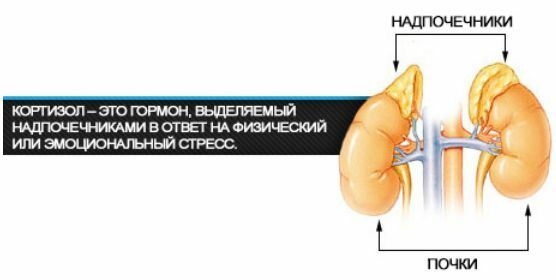The study of the hormone TSH( TSH) level helps to assess the thyroid status and is included in the mandatory list of tests during pregnancy, because it can be used to judge the level of T3 and T4.
A thyroid-stimulating hormone( TSH) is produced in the appendages of the brain. Its bulk is synthesized in the anterior pituitary gland, a small part in the pituitary gland. Its main task is to act on the surface receptors of the thyroid gland and, thereby, stimulate the production of hormones T3( triiodothyronine) and T4( thyroxine) in it.
T3 and T4 are thyroid hormones that regulate the basic metabolism at the cellular level in all human organs. However, during pregnancy, they take on additional functions:
- at the time of conception - stimulate the yellow body of the ovaries, thereby affecting the preservation and development of the embryo in the early stages;
- in the first trimester - accelerate the development of fetal brain cells;
- throughout pregnancy - control the timely formation and normal development of all organs.
Indicators TTG

The norm of TTG is the indices of from 0.4 to 4 μIU / mL .During pregnancy, these numbers should be within the between 0.24 and 2.4( 2.5) μIU / mL .
For thyrotropin, there are fluctuations in secretion during the day: the maximum level is observed from 2 to 4 am and from 6 to 8 am, the minimum values are for evening time - from 17-00 to 18-00.
One of the tasks of the future mother and her accompanying doctor is to maintain the level of TSH within these limits, since it is these indicators that are considered safe and, to a large extent, protect the future baby from the pathologies of intrauterine development.
4"> Interaction of TTG and T3, T4
Why should I follow TSH?It is important to understand that the thyroid hormones do not immediately respond to an increase in the concentration of TSH.This takes 2-3 weeks. However, increase in the level of T3 and T4 almost immediately affects the TSH, and its production temporarily discontinued .As soon as the body uses the developed thyroid hormones, their lowered level will again trigger the secretion mechanism of TSH in the pituitary gland.
In this chain, TTG has the leading role, and if its indicators are not maintained at a certain level, then there are peculiar swings of T3 and T4.Normally, these "swings do not swing very much" and self-regulating. However, in diseases of the pituitary gland or thyroid, such regulation is violated.
During pregnancy there is a physiologically necessary change in the hormonal background in the body of a future mother, which can be attributed to the cause of a failure in the pituitary( TSH) chain - the thyroid gland( T3, T4) .The UFA technique for determining the level of TSH allows the doctor, if necessary, to maintain the concentration of T3 and T4 with medicinal preparations at a proper safe level.
Fertilization of the ovum and thyrotropin level
Is it real to conceive with elevated TSH?
An increase in the value of TTG indicates not only the diseases of the pituitary and thyroid gland. His level temporarily rises after:
- strong stress;
- asymptomatic microinfarction;
- traumatic chest injury.
It varies with chronic kidney or liver disease, certain mental illnesses. Prolonged sleep disorder may also be responsible for disrupting the normal rhythm of thyrotropin secretion.
If the elevated level of TSH has not had time to influence the full development of the ovum and its ovulation, then the onset of pregnancy is quite possible.
Immediately after the beginning of the division of the fertilized egg, chorionic gonadotropin( hCG) begins to be secreted, which causes the thyroid gland to work in a strengthened mode - the is 1.5 or 2 times higher than the norm. As a result, a dramatically increased synthesis of T3 and T4, very quickly lowers the level of TSH.
Prevent the emergence of pregnancy is not an indicator of TSH, but diseases that depress the fertile function and cause infertility:
- manifest hypothyroidism - TTG high + T4 low;
- hyperprolactinemia is an increased level of prolactin( another hormone of the pituitary gland).
Subclinical form of hypothyroidism( TSH elevated, T3 and T4 normal) is not an obstacle to the onset of pregnancy. However, it should be remembered that even in the absence of diseases, long-term elevated TSH will lead to low T3 and T4, which will adversely affect the metabolic processes and ovarian function: the maturation of follicles with ovules will be disrupted and the development of the yellow body will be inhibited, thereby creating problems with conception.
Pregnancy and TSH values

In order to avoid unpleasant consequences, when planning pregnancy for women with thyroid problems or unsuccessful experience of previous pregnancies, it is recommended:
- make ultrasound thyroid;
- to pass the analysis and normalize TTG before conception;
- to check its level up to 10 weeks.
First trimester
Most often in pregnant healthy women in the first trimester of pregnancy, the level of TSH decreases with respect to the normal rate. Ideally, it should be no higher than 2.4-2.5 μIU / mL - should focus on average figures of 1.5 to 1.8 μIU / mL .In the case of multiple pregnancies, even significantly lower values approaching "0" are considered normal.
Second and third trimester
At the end of the 18th week of pregnancy, the thyroid gland begins to function in the fetus, which was previously provided by the mother's hormones. Therefore, a peculiar mechanism for protecting the fetus from hormonal intoxication is included:
- , the yellow body, which induced progesterone before, dissolves and this function is taken over by the developed placenta;
- increases the level of estrogen secretion, which causes increased formation of carrier proteins and the number of free T3 and T4 in the blood drops;
- smooth decrease in T3 and T4 and the transfer of thyroid work from the enhanced mode to normal promotes lowering of hCG.
All these interrelated events contribute to the physiological elevation of the TSH standard within the indicated limits for pregnant women. Further, up to delivery, the indicators will individually fluctuate, but should not exceed the specified limits. Competently judged on their magnitudes can only watch the doctor of a female consultation or gynecologist-endocrinologist who, at his discretion and according to the testimony, will prescribe the number and timing of the ELISA test for the maintenance of thyrotropin, free T3 and T4.
Complications in case of abnormal TTG during pregnancy
Weakened thyroid function and a sharp decrease in TSH, practically to zero, signals the development of pregnant hypothyroidism, which is fraught with consequences:
- spontaneous abortions in the early stages;
- placental abruption;
- inhibition of growth and malformations of the fetus;
- is a congenital hypothyroidism in a baby, which leads to mental and physical disabilities.
Elevated TSH during pregnancy is no less dangerous than lowered. At the future mother there is a danger of development of thyrotoxicosis and, as a consequence, late toxicosis( gestosis), which can cause the artificial termination of pregnancy. A high level of the hormone TSH causes the development of malformations of the nervous system, deformities or fetal death. Therefore, when the increased value can not be normalized with the help of drug treatment( L-thyroxine), the part of the thyroid gland is used. Resection is conducted between 12 and 26 weeks of pregnancy.
Today, when you can rarely find a healthy young woman who is able to easily become pregnant, one should take seriously the health of her future child and become pregnant only after careful planning. Before conception consultation of the endocrinologist is necessary. To the delivery of tests should be approached with maximum responsibility - this will save not only nerves, but money. The ideal index of thyroid stimulating hormone during pregnancy is 1.5 μIU / ml.



